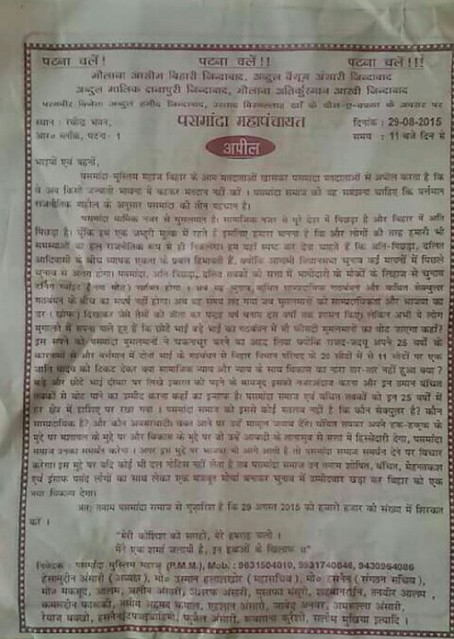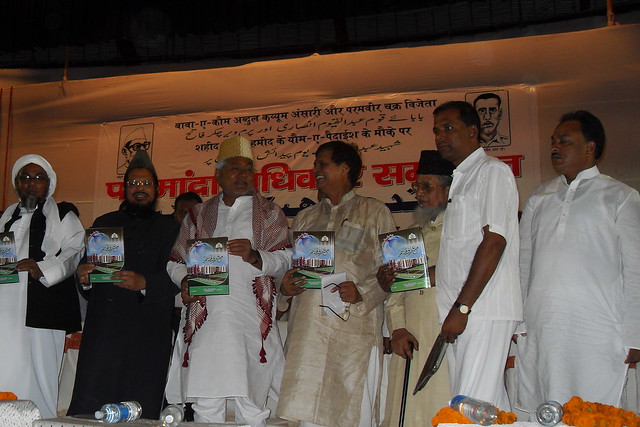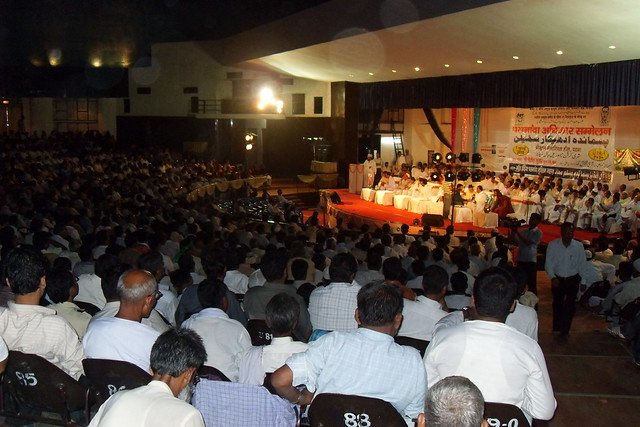By Abhay Kumar for TwoCircles.net,
Patna/New Delhi: An association of Pasmanda Muslims has said that it may consider supporting the Bharatiya Janta Party if it accepts its demands that include proportionate share in power.
Formed in 1998, the Pasmanda Muslim Mahaz (PMM) is going to hold a convention (mahapanchayat) in Patna’s Ravindra Bhavan on August 29 in which the participants are likely to deliberate on PMM’s future course of action, including lending support to the BJP in the upcoming Bihar Assembly election.

A poster of the PMM for the August 29 Mahapanchayat.
The organisers have claimed that thousands of Pasmanda Muslims are expected to turn up in the meet. Campaigns to mobilise people have been intensified in places like Bhabhua, Chhapra, Siwan, Gopalganj, Vaishali, Ara, Jahanabad, Gaya, Aurangabad and Banka.
Pasmanda, a Persian term, refers to those who have “fallen behind”, according to Masawat ki Jung, a widely-cited book by former leader of the PMM and JD (U) MP Ali Anwar. Simply put, Pasmanda Muslims are from backward (shudra) and Dalit (ati-shudra) castes, which converted to Islam centuries ago, but remain backward in to socio-economic hierarchy.
The population of Muslims in Bihar is 16.5 per cent of the total population; out of which the share of Pasmanda Muslims is said to be overwhelming. Pasmanda Muslims can influence the result of a large number of assembly seats in Bihar. In 2010 Assembly Election, the Pasmanda Mahaz extended their support to Nitish Kumar, which, according to PMM leaders, contributed in Nitish’s landslide victory.
The theoreticians of Pasmanda politics argue that lower caste Muslims face caste discrimination at the hands of Ashraf (upper castes) Muslims, who dominate them materially and culturally. For example, the traditional upper caste Muslims continue to remain overrepresented in both secular and religious institutions. Besides, they have often come in for sharp criticism from the pasmanda leaders for taking up “emotive” identity issues, such as Babri Masjid and Urdu, instead of focusing on substantive issues like employment and education.

2010 TCN Photo of a Pasmanda convention where Nitish Kumar was also present, along with Ali Anwar and others.
Justifying the decision of the PMM, its organising secretary Mohammad Hasnain said: ‘We want share in power. We will, therefore, support any party, including the BJP, which are willing to accept our demands.’
The key demands of the PMM include seats in assembly election, according to the population, a share in government, inclusion of Dalit Muslims to SC category and rights for Muslim artisans.
In support of his position, forty-four year old Mohammad Hasnain, PMM’s Organisation Secretary makes an interesting interpretation of Islam: ‘‘Islam has permitted that if one has to save one’s life, one can adopt any method. Similarly, we are justified to take any step so as to remove our political marginalisation.’
Significant are PMM’s virulent attacks on 25 years’ tenure of Lalu-Rabri regime and Nitish Kumar. In an indirect reference to Lalu Prasad Yadav, the PMM leader says that the days are over when Pasmanda Muslims were asked to vote for secular forces by showing the fear of the BJP. Similarly, Nitish Kumar is also pulled up for failing to live up to their expectation.
‘In many Pasmanda-dominated areas, Lalu has often given tickets to Yadavs and Nitish to Kurmis,’ Hasnain alleged, in conversation with TwoCircles.net.
Yet another criticism of the PMM against Lalu and Nitish is that they apply double standard in seeking votes from Hindus and Muslims. While they primarily address backwards among Hindus, they do not make such an appeal to Pasmanda Muslims. In other words, Lalu and Nitish are criticised for treating Muslims as a homogeneous religious category.
The emergence of Pasmanda Muslim organisations/movements in post-Independence India can be traced to the Mandal politics of the 1990s, according to AMU historian Mohammad Sajjad. But within the two decades of its history, the Pasmanda movement has suffered many splits as well as ideological reconfigurations.

2010 TCN Photo of a Pasmanda convention where Nitish Kumar was also present, along with Ali Anwar and others.
For example, the first major setback to the Pasmanda movement occurred in 1998 when the All India Backward Muslim Morcha (AIBMM, formed in 1994) suffered a split on the issue of extending reservation to a Shaikh caste to the OBC category. In October 1998, Ali Anwar led a protest against this and moved out of the organisation to form the PMM. Almost ten years later, in January 2009, the PMM expelled its president Ali Anwar for some reasons including his support for a candidate fighting election on the BJP ticket in Bihar. Ironically, the same organisation has now no qualms about supporting the BJP.
As a result, the PMM has come in for a sharp criticism. For example, Ali Anwar has alleged that the leaders of the PMM were making such a statement under the influence of the BJP. “The BJP has paid them to make such a statement. The leaders of the PMM have no base and they have been rejected by people. Such leaders often mushroom on the eve of election to serve their own interests,” Ali Anwar told TwoCircles.net.
Similarly, the founder of AIBMM and former MP Dr Eijaz Ali sees the personal interests of PMM leaders behind the convention. “Much like the fundamentalist forces, the leaders of the PMM are doing this exercise to get share in power. Unlike agendas of personal gains, we should address the main concerns of the country such as price rise, unemployment and corruption,” he told TwoCircles.net.
When asked if the leaders of the PMM were not justified in taking up the issue of proportionate share in power for lower caste Muslims, Dr Ejaz Ali responded that the real issue for the empowerment of backward Muslims is the inclusion of Dalit Muslims under SC category. He further says that if these leaders would be able to persuade the BJP to support this cause, then he, too, would join them in making an appeal to all Muslims to vote for the BJP.
Rizwan Darbhangi, Bureau chief of Patna-based Urdu daily Qaumi Tanzeem, too, echoes the same sentiments. “Some people are out there to fool the society. But holding such a convention, the leaders would only fulfil their personal interests and the Pasmanda samaj is not going to benefit from this,” he told TCN.
But when asked to comment on the views of the PMM that the failure of the forces of secular and social justice have “compelled” them keep all options open, including the support to the BJP, Darbhangi said, “if the PMM perceived the previous governments to be a failure in addressing Muslim issues that does not mean that they would drink poison (zahar).”
Calling the move of the PMM to hold a convention as an example of interest groups’ politics, Arshad Alam, an assistant professor of JNU and keen observer of Pasmanda Movements, said that while the PMM is correct to an extent, to say that the previous governments in Bihar had not addressed their issues but that did not mean that they should go to the BJP, which they themselves had earlier called a party of swarna (upper castes).
Tanweer Fazal, another faculty member of JNU and an expert on minority politics, says that even if the PMM gives a call for supporting the BJP, Pasmanda Muslims would not vote for the BJP, which plays “communal” and “majoritarian politics”. He added, “As far as electoral politics is concerned, till there is a danger of communalism and majoritarian politics, minority would not vote for the BJP, despite the fact that the secular parties in Bihar have not given the minority the space which they would have liked it.”
With the Bihar Assembly Election drawing closer, the political equation is fast changing. Will the PMM support the BJP and end up spoiling the game for the Lalu-Nitish allaince? Or is it an exercise by the PMM to pressurize the RJD and JDU to come to negotiate with them ahead of the Bihar polls? That would only be clear in few weeks’ time!
……….
(Abhay Kumar is pursing PhD at Centre for Historical Studies, Jawaharlal Nehru University, New Delhi.)
Related:
Muslim leadership has always ignored Dalit Muslims: Dalit Muslim leaders
Ali Anwar’s struggle for Pasmanda Muslims

